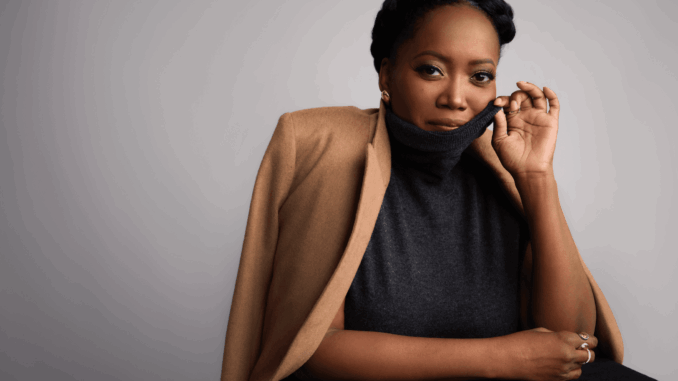
When audiences first met Erika Alexander as Maxine Shaw on the groundbreaking 90s sitcom Living Single, they were introduced to more than just a memorable character—they witnessed the emergence of a cultural icon. Maxine wasn’t just smart, funny, and unapologetically independent; she represented a new kind of Black woman on television: professionally successful, emotionally complex, and boldly herself.
But while Living Single gave Erika Alexander national recognition and a devoted fanbase, it was only the beginning of a much larger journey. Far from being defined by a single role, Erika has spent the decades since blazing an extraordinary path that few in Hollywood have managed to walk. With a fearless commitment to justice, storytelling, and innovation, she has transformed herself from beloved actress to creative force, media entrepreneur, and social activist.
Her evolution is not simply a comeback story—it’s a powerful narrative of growth, purpose, and self-determination. In an industry that often sidelines women—especially women of color—after their breakout roles, Erika Alexander has done the opposite. She’s expanded, diversified, and redefined what success looks like.
Today, Erika isn’t just contributing to culture—she’s shaping it, with the kind of long-term impact that transcends trends and time. This is the story of how she did it.
Contents
From Sitcom Royalty to Dramatic Standout

After Living Single concluded in 1998, Erika Alexander could have faded into the background like so many sitcom stars of the 90s. But she had no intention of being boxed into a single typecast role. Instead, she deliberately pivoted toward deeper, more nuanced characters across film and television.
One of her early standout appearances came in Judging Amy and later Law & Order: SVU, showcasing her dramatic chops. But it was her role in Jordan Peele’s critically acclaimed thriller Get Out (2017) that reintroduced Erika Alexander to a new generation of viewers. Even in a supporting role, her presence was unforgettable.
She continued to land roles in culturally resonant series such as Black Lightning, Wu-Tang: An American Saga, Run the World, and Ava DuVernay’s American Fiction. These projects weren’t just acting gigs—they were vehicles for meaningful, often revolutionary storytelling centering Black identity, history, and future.
Erika Alexander’s performances post-Living Single have consistently brought authenticity, depth, and power to the screen. She is not just acting—she’s uplifting narratives that matter.
Erika Alexander the Creator: Building a New Media Future

In a time when content creation is more democratized but still systemically biased, Erika Alexander has taken bold steps behind the camera. She is not waiting for the industry to offer her opportunities—she’s building them herself.
Alongside her business partner Ben Arnon, she co-founded Color Farm Media in 2018. The mission? To bring greater equity to film, television, and tech through storytelling that centers marginalized communities. Known as “the Motown of film, TV, and tech,” Color Farm is a production company with a purpose.
One of its most celebrated works is the documentary John Lewis: Good Trouble, which Erika co-produced. Chronicling the life of civil rights legend Congressman John Lewis, the film is a stirring tribute to the power of activism, protest, and perseverance.
Erika also created and co-wrote the award-winning graphic novel Concrete Park, a sci-fi epic that features people of color in a gritty, dystopian future. The comic book not only garnered critical acclaim but was hailed as a game-changer in a genre that rarely features diverse leads.
Through Color Farm, Erika Alexander is reshaping the industry one story at a time. She’s more than a performer—she’s a visionary content architect, telling stories that reflect reality, ignite empathy, and inspire change.
Fearless Advocate for Justice and Representation
What sets Erika Alexander apart from many in Hollywood is her unwavering commitment to social justice—not just in her roles or scripts, but in her real life.
She is a vocal political activist, working with major campaigns and advocacy groups to address systemic inequality. Erika has been a tireless supporter of voting rights initiatives, partnering with organizations such as VoteRiders and The Poor People’s Campaign. She also helped campaign for figures like Hillary Clinton and Stacey Abrams, using her celebrity platform to encourage voter turnout, especially in marginalized communities.
Unlike celebrities who shy away from politics, Erika confronts issues head-on—whether it’s through a viral speech, a podcast appearance, or a panel discussion. She believes in using art as activism, and her work reflects that intersection.
Her advocacy isn’t performative; it’s embedded into every part of her professional and personal life. She sees storytelling not just as entertainment, but as a tool for resistance, education, and collective healing.
A Legacy of Empowering Black Women

From Maxine Shaw to her present-day projects, Erika Alexander has consistently championed Black women’s voices in media.
She has long spoken out about the lack of representation in writers’ rooms, the scarcity of complex roles for women of color, and the systemic barriers that exclude Black creatives from decision-making positions. But unlike many who critique the system, Erika has taken action to rebuild it.
Through Color Farm Media and her work on Concrete Park, she has created spaces where Black women can tell their own stories—on their own terms. She mentors young creatives and collaborates with up-and-coming voices, ensuring that the next generation doesn’t have to fight the same battles she did.
Her work consistently redefines what Black female excellence looks like in media: multifaceted, bold, and uncompromising.
The Future of Erika Alexander: Visionary, Leader, Icon
With over three decades in the entertainment industry, Erika Alexander continues to evolve, refusing to be limited by traditional categories or expectations.
Her future is as dynamic as her past. She is developing original content across formats—TV, film, comics, podcasts—and platforms. Whether through Color Farm or independent collaborations, Erika is dedicated to exploring bold themes like Afrofuturism, intergenerational trauma, political identity, and joy in the Black experience.
As more audiences seek inclusive, authentic content, Erika Alexander is uniquely positioned to lead that cultural shift. Her work is timely, relevant, and most of all—intentional.
In a world often obsessed with short-term fame and virality, Erika is building a lasting legacy of purpose-driven creativity.
Why Erika Alexander Matters More Than Ever

More than just an actress, Erika Alexander is a storyteller, producer, activist, and truth-teller. Her journey after Living Single is not just a success story—it’s an inspirational blueprint for artists seeking to merge creativity with impact.
She has shattered boundaries, uplifted communities, and reshaped the entertainment industry on her terms. From sitcom legend to cultural leader, Erika’s evolution is a testament to what’s possible when talent meets tenacity and vision.
In an industry where so many fade, Erika Alexander continues to rise—not as a star from the past, but as a luminary guiding us toward a better, more inclusive future.
See more at KpopAll and fanpage Living Single Fans and We Love Living Single.

Leave a Reply